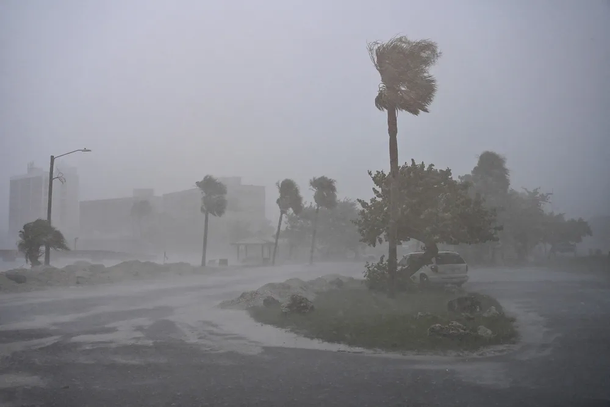Hurricane Milton made landfall on the Florida coast on Wednesday, bringing powerful winds and creating hazardous storm surges in an area still recovering from a significant storm just two weeks earlier.
The storm struck as a Category 3 system near Siesta Key, impacting a densely populated region along the western coast of the state. Prior to its arrival, Milton also produced tornadoes, with unverified reports indicating multiple fatalities linked to one tornado that hit a senior living community on Florida’s east coast.
President Joe Biden received updates on the “initial impacts” of Milton, with the political responses from both Democrats and Republicans expected to be closely monitored as the US presidential election approaches in four weeks.
Winds reached speeds of up to 105 miles per hour (165 kilometers per hour) on Wednesday night, as reported by the National Hurricane Center. The storm was predicted to cause significant tidal surges along Florida’s low-lying Gulf Coast.
By late Wednesday, more than 1.6 million residents and businesses were without power, according to poweroutage.us. Milton was anticipated to move inland toward the Atlantic, potentially affecting popular tourist destinations like Orlando, where Disney World had closed in anticipation of the storm.
In various cities along Florida’s western coast, strong winds and heavy rainfall prompted residents to seek shelter. In Sarasota, near the storm’s landfall location, wind gusts shattered windows along the waterfront, leaving streets nearly deserted and trees bent almost to the ground under the strain.
Florida’s airports in Tampa and Sarasota were closed indefinitely as preparations continued. Just before Milton hit, Governor Ron DeSantis urged those who had not evacuated to stay indoors and avoid traveling, warning of the dangers posed by floodwaters and storm surges.
Milton’s arrival followed closely on the heels of Hurricane Helene, which had already devastated parts of Florida and the southeastern US, claiming at least 235 lives while emergency crews continued their relief efforts.
Local business owner Randy Prior expressed concern, noting, “I am nervous. This is something we just went through with the other storm — the ground is saturated, and we’re still recovering from that.” He planned to weather the storm at home after recently enduring the impacts of Hurricane Helene, which caused extensive flooding in Florida and further destruction in western North Carolina.
In the political arena, US presidential candidate Donald Trump attempted to leverage the situation by alleging that storm aid was being diverted from local residents, many of whom support his Republican Party, to migrants.
At the White House, President Biden denounced Trump’s “onslaught of lies,” stating, “There’s been a reckless, irresponsible, and relentless promotion of disinformation and outright lies.” Vice President Kamala Harris supported Biden’s remarks, emphasizing the danger of misleading people in need of assistance.
Experts have noted that climate change contributes to the severity of storms, as warmer ocean temperatures release more water vapor, intensifying storms and their winds.
ALSO READ : Mbare Musika Fire: Call for Improved Facilities and Tax Integration for Informal Traders

For comments, Feedback and Opinions do get in touch with our editor on WhatsApp: +44 7949 297606.
